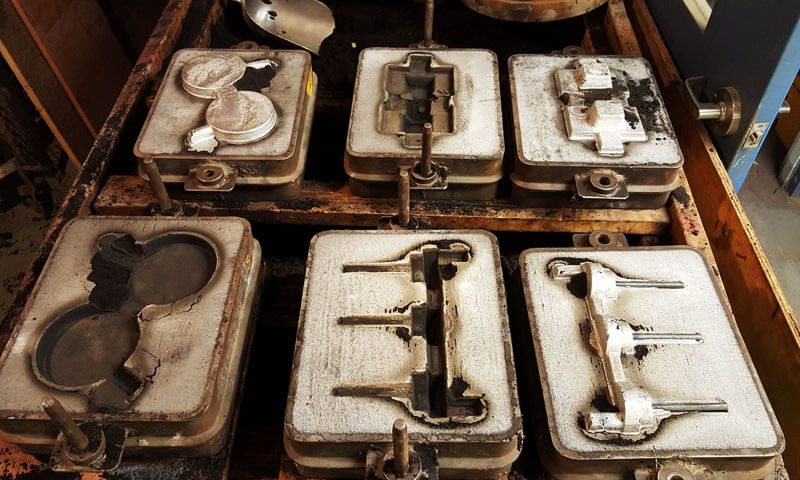Finest Practices for Upkeep and Applications in the Aluminum Factory Sector: A Detailed Introduction
Maintaining equipment in the aluminum factory market is crucial for functional success. Regular examinations and anticipating upkeep can substantially reduce downtime and enhance safety and security. Advanced technologies, such as IoT and data analytics, play a crucial function in this process. However, comprehending the full extent of ideal practices calls for a closer exam of particular approaches and their influence on performance. What are the crucial components that contribute to a trusted maintenance framework?
Relevance of Regular Upkeep in Light Weight Aluminum Foundries
Routine upkeep plays a necessary function in the efficient operation of light weight aluminum factories. By systematically evaluating and servicing equipment, foundries assure peak efficiency and long life of equipment. Normal maintenance activities, such as cleaning, lubrication, and component replacement, assistance avoid unexpected malfunctions that can lead to expensive downtime.
Additionally, routine checks enhance workplace safety by recognizing potential threats prior to they escalate into serious problems. Equipment that is properly maintained runs a lot more successfully, bring about improved item top quality and lowered waste. In addition, adherence to an organized upkeep schedule can sustain compliance with market laws, therefore promoting an online reputation for integrity and high quality within the marketplace.
Applying Anticipating Maintenance Strategies
Predictive maintenance techniques take the principles of regular upkeep an action additionally by leveraging data analytics and progressed monitoring innovations. In light weight aluminum foundries, these approaches make it possible for operators to anticipate devices failings prior to they take place, thereby reducing unplanned downtimes and maximizing functional performance. By making use of sensors and IoT tools, real-time data can be gathered on machine efficiency, enabling the identification of prospective concerns via predictive analytics.
Optimizing Melting and Pouring Processes
Reliable melting and putting procedures are vital for making the most of efficiency and ensuring the quality of aluminum castings. To improve these processes, factories should concentrate on specific temperature level control throughout melting, as this directly impacts the metallurgical homes of the alloy. Using innovative melting modern technologies, such as induction and resistance melting, can enhance power performance and decrease cycle times.
Moreover, implementing automated pouring systems minimizes human error and keeps consistency in the pouring process. Proper mold preparation, including appropriate preheating, is necessary to avoid thermal shock and enhance mold and mildew longevity.

Enhancing Safety Procedures in Factory Procedures
Prioritizing security in light weight aluminum factory procedures is essential for securing employees and ensuring an efficient environment. Efficient security methods include normal training sessions that highlight the significance of individual protective tools (PPE), such as headgears, gloves, and safety glasses. Additionally, the facility of clear emergency treatments is vital in handling possible accidents.
Routine examinations of equipment and equipment help determine dangers before they rise right into explanation major concerns. Applying a durable reporting system motivates employees to connect safety and security worries without concern of repercussion. In addition, promoting a culture of safety and security guarantees that every employee understands their function in preserving a safe and secure work environment.
In enhancement, ensuring appropriate ventilation and surveillance air high quality can minimize exposure to hazardous fumes and dirt. By strengthening these techniques, aluminum shops can greatly lower the danger of accidents and develop an environment where staff members really feel valued and safe, ultimately improving overall operational efficiency.
Leveraging Modern Technology for Improved Effectiveness
Utilizing innovative technology has actually ended up being significantly important for aluminum foundries aiming to improve functional effectiveness. Automation and robotics play an important function in enhancing manufacturing procedures, decreasing labor expenses, and decreasing human error. Carrying out real-time tracking systems allows for the continual analysis of devices performance, making it possible for proactive maintenance and reducing downtime.
Additionally, the assimilation of data analytics gives useful insights right into functional workflows, facilitating better decision-making and source appropriation. Predictive analytics can identify prospective failings prior to they happen, further enhancing upkeep timetables.
Additionally, adopting innovative melting and casting innovations improves power performance and product return, which are fundamental for sustainability in the market. By embracing these technical advancements, aluminum foundries can not only boost performance yet additionally maintain an one-upmanship in a significantly demanding market (Aluminum Casting). Ultimately, leveraging modern technology is pivotal in driving technology and enhancing general functional performance within click over here the field

Regularly Asked Inquiries
What Prevail Indications of Devices Put On in Aluminum Foundries?
Typical indicators of tools wear in light weight aluminum factories consist of uncommon noises, decreased effectiveness, boosted resonance, overheating elements, leakages, and visible rust. These indicators often signify the requirement for maintenance or potential replacement to avoid costly downtime.
Exactly How Can I Train Personnel for Effective Maintenance Practices?
To educate personnel for efficient maintenance methods, one can carry out hands-on workshops, establish extensive guidebooks, motivate mentorship programs, and conduct normal assessments to examine abilities and knowledge, guaranteeing all employees recognize maintenance protocols completely.
What Are the Ecological Regulations for Aluminum Foundries?
Light weight aluminum shops undergo different environmental guidelines, including discharges control, waste administration, and source conservation. Conformity assurances marginal environmental influence, advertising sustainability while sticking to local, nationwide, and worldwide environmental requirements and policies.
How Do Factories Manage Waste and Recycling of Aluminum?
Foundries manage waste and recycling by carrying out systems for accumulating scrap light weight aluminum, making use of sophisticated splitting up modern technologies, and teaming up with reusing centers to guarantee reliable recovery processes, thus decreasing ecological impact and advertising sustainability within the sector.
What Are the Expenses Connected With Executing Advanced Technologies?
Carrying out advanced technologies in foundries sustains substantial prices, including preliminary investment, training, and upkeep costs. The long-lasting benefits, such as boosted performance and reduced waste, usually validate these expenditures, leading to boosted earnings. (aluminum casting company)
